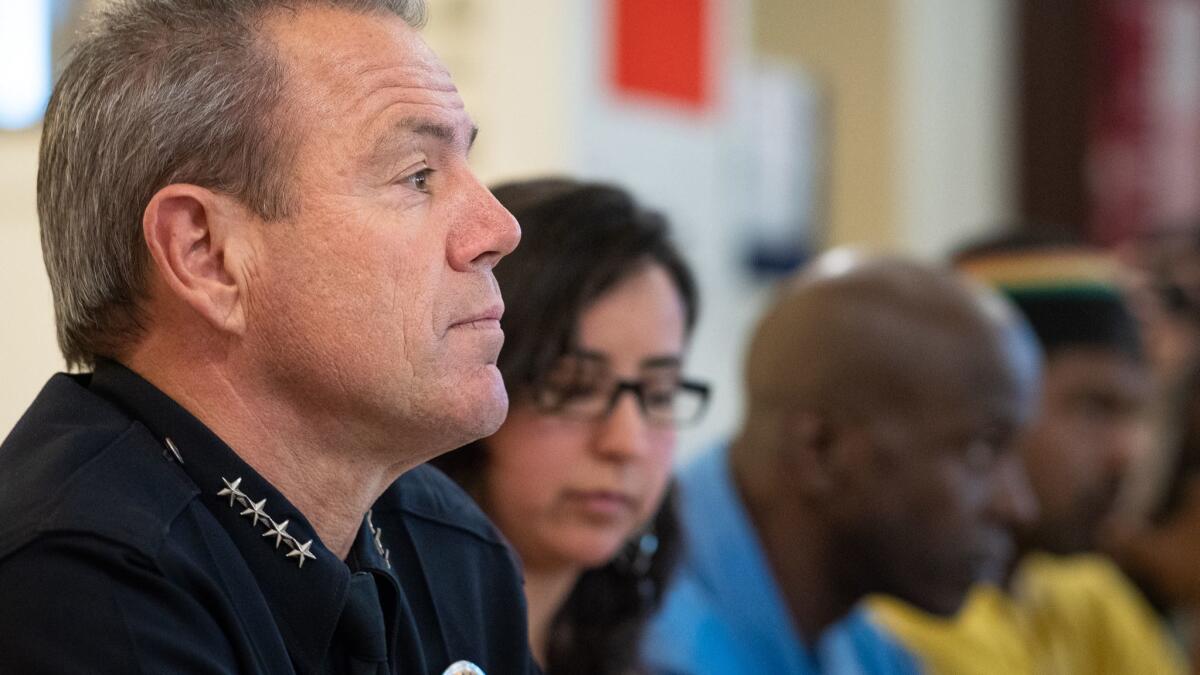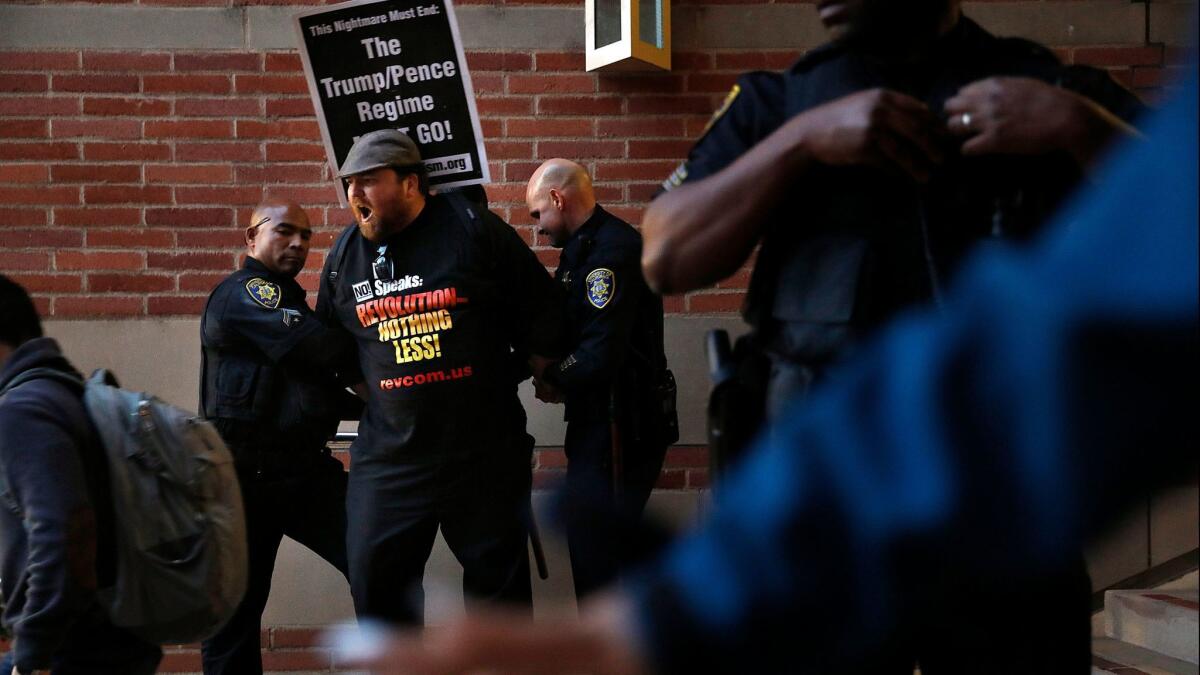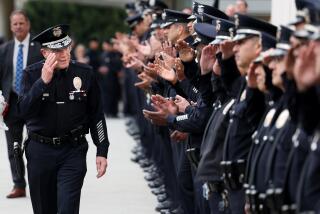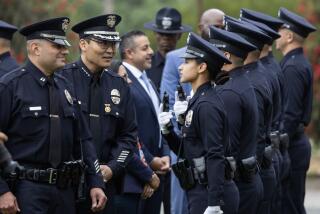LAPD chief promises public report on use of informant against anti-Trump protesters

Days after a Los Angeles Times report revealed that the LAPD ordered an informant to spy on members of a political group planning protests against President Trump in 2017 in Los Angeles, Chief Michel Moore said Tuesday that his agency would soon publish findings of an investigation into the matter.
Moore told the city’s civilian Police Commission that the Office of Constitutional Policing and Policy could finish its review of the LAPD’s decision to place an informant inside the group Refuse Fascism in as little as two weeks, and promised to make those findings public.
But as members of the group and other community activists stood up to criticize the use of the informant during Tuesday’s meeting, Moore also suggested the group had been linked to violent actions in the past in other cities, including arson and assault.
For four weeks in October 2017, the LAPD’s Major Crimes Division sent the informant to secretly record audio of Refuse Fascism’s meetings, which were held inside an Echo Park church, as the group planned demonstrations to mark the one-year anniversary of President Trump’s election. Civil rights advocates and experts who monitor the political fringe have said the LAPD’s tactics needlessly stepped on the group’s First Amendment rights, since Refuse Fascism has rarely been linked to violence.
Information about the informant’s presence at Refuse Fascism’s meetings became public as part of an ongoing criminal case against several members of the group who were arrested for blocking a downtown section of the 101 Freeway during anti-Trump demonstrations in late 2017.
On Tuesday, Moore said that members of Refuse Fascism in Los Angeles had traveled to demonstrations in other cities where violence had occurred, including a February 2017 demonstration against conservative provocateur Milo Yiannopoulos at UC Berkeley’s campus that left several people hurt.
Moore, however, said it was unclear if members of the L.A. chapter played any role in the violence that occurred in other cities.
“The investigation, as I understand it today, is that members that identified themselves as being within this group had traveled to other parts of the country, and that in other parts of the country, there had been criminal acts including vandalism, assault with a deadly weapon or arson,” Moore said. “Whether or not these individuals that are here in the L.A. group who traveled to those other locations and those other protests that saw those type of attacks were the ones responsible or not I believe was part of this investigation.”

Berkeley was home to several political rallies that devolved into street brawls in 2017, with far-right figures and groups linked to white nationalism often trading punches with masked anti-fascists and other left-wing protesters using so-called “black bloc” tactics.
Refuse Fascism has a chapter in the Bay Area, and the group has been involved in several demonstrations against the Trump Administration across the U.S.. But it is unclear what, if any, involvement the group or its Los Angeles members had in violence in Berkeley in 2017.
Police records show the majority of those arrested during violent demonstrations in Berkeley in 2017 were from the Bay area. A Berkeley police spokesman declined to comment on the group.
Taken together with other instances of political violence that rocked the country in 2017 — including the white supremacist rally in Charlottesville, Va., that left a woman dead and dozens injured — Moore said the department was on high alert for potential threats on the anniversary of Trump’s victory.
“I was aware that there were protest activities involving acts of violence and crimes that were beyond civil disobedience, and concerned for the safety of the city of Los Angeles on the one-year anniversary of President Trump’s election,” Moore said. “There was an active investigation within the department to determine ... how those threats and rumors and other tips and leads may manifest themselves, and if there was actual merit to it.”
Ultimately, the protest that Refuse Fascism organized on Election Day 2017 ended in just two arrests and no injuries.
Members of Refuse Fascism shouted at Moore after he suggested the group was linked to criminal activity, referring to his remarks as “slander.” Isabel Cardenas, a longtime city activist who is also affiliated with the group, called on the Police Commission to explain why they had been subject to covert surveillance.
“Who of you ordered a police informant to spy on our meetings, held at a church no less?” Cardenas asked. “We are not terrorists. Our constitutional rights were violated.”
Questions about who approved the use of the informant also continued to swirl on Tuesday. The Police Commission requires the department’s anti-terrorism intelligence section to seek the approval of the commission’s president or a member of the board’s Undercover Investigation Committee before it deploys an informant. But officials have said the commission was not consulted about the 2017 investigation.
An LAPD spokesman previously told The Times the informant was deployed as part of a criminal investigation, so the commission’s approval would not have been required. Moore said Tuesday that former Police Chief Charlie Beck was consulted, and ultimately approved, of the informant’s use in 2017.
Times staff writer Paige St. John contributed to this report.
More to Read
Sign up for Essential California
The most important California stories and recommendations in your inbox every morning.
You may occasionally receive promotional content from the Los Angeles Times.











